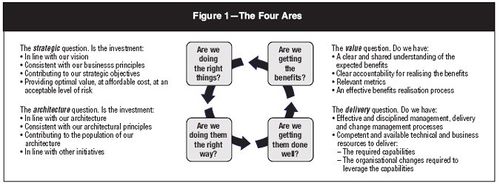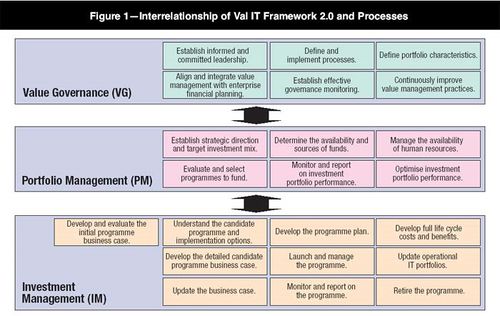Val IT Framework
What is Val IT Framework?
VAL IT (Value from IT investments) is a framework for the governance of information technology-enabled business investments. Val IT is a framework for managing and optimizing the value of information technology (IT) investments. It is designed to help organizations understand the value that they can expect to receive from their IT investments and to identify opportunities to improve the value of those investments over time. VAL IT Framework has been developed by the IT Governance Institute (ISACA).
The Val IT framework consists of three main components: value governance, value delivery, and value realization.
- Value governance: This component of the Val IT framework focuses on the management and oversight of IT investments. It includes processes and procedures for making informed decisions about IT investments, and for managing the risks associated with those investments.
- Value delivery: This component of the Val IT framework focuses on the effective delivery of value from IT investments. It includes processes and procedures for planning, implementing, and managing IT projects, and for ensuring that those projects are delivered on time, on budget, and to the required quality standards.
- Value realization: This component of the Val IT framework focuses on the measurement and optimization of the value that is realized from IT investments. It includes processes and procedures for tracking and reporting on the value of IT investments, and for identifying opportunities to improve the value of those investments over time.
Overall, the Val IT framework is an important tool for organizations looking to maximize the value of their IT investments and to ensure that those investments are aligned with the overall goals and objectives of the organization.
Explaining the Val IT Framework
The Val IT framework is a comprehensive and pragmatic organizing framework that enables the creation of business value from IT-enabled investments. Designed to align with and complement COBIT, Val IT integrates a set of practical and proven governance principles, processes, practices, and supporting guidelines that help boards, executive management teams and other enterprise leaders optimize the realization of value from IT investments. Val IT provides direct support to executives at all management levels across both business and IT organizations—from the CEO and other leaders within the C-suite, to managers and administrators directly involved in the selection, procurement, development, implementation, deployment, and benefits realization processes. Used with considerable success by leading organizations for many years, the proven processes and practices within Val IT are presented—for the first time ever—as one single integrated governance framework that provides business and IT decision-makers with a comprehensive, consistent, and coherent approach to creating concrete and measurable business value.[1]
The objective of the Val IT Framework is to maximize the business value created from IT investments in an enterprise using governance best practices. Toward that end, it defines three major domains, seven guiding principles, a set of processes, and management practices to support and help executive management and boards at an enterprise level in making better decisions about IT investments.
VAL IT Framework Current Version[2]
The latest release of the framework, published by IT Governance Institute (ITGI), based on the experience of global practitioners and academics, practices, and methodologies was named Enterprise Value: Governance of IT Investments, The Val IT Framework 2.0. It covers processes and key management practices for three specific domains and goes beyond new investments to include IT services, assets, other resources, and principles and processes for IT portfolio management.
VAL IT Domains
Val IT is a complete framework covering three major domains:
- value governance
- portfolio management and;
- investment management processes and activities.
Principles of Val IT[3]
- IT-enabled investments will be managed as a portfolio of investments.
- IT-enabled investments will include the full scope of activities that are required to achieve business value.
- IT-enabled investments will be managed through their full economic life cycle.
- Value delivery practices will recognize that there are different categories of investments that will be evaluated and managed differently.
- Value delivery practices will define and monitor key metrics and will respond quickly to any changes or deviations.
- Value delivery practices will engage all stakeholders and assign appropriate accountability for the delivery of capabilities and the realization of business benefits.
- Value delivery practices will be continually monitored, evaluated, and improved.

Source: ITGI
The Goal of Val IT[4]
The goal of the Val IT initiative, which includes research, publications, and support services, is to help management ensure that organizations realize optimal value from IT-enabled business investments at an affordable cost with a known and acceptable level of risk. Val IT provides guidelines, processes, and supporting practices to assist the board and executive management in understanding and carrying out their roles related to such investments. While applicable to all investment decisions, Val IT is primarily targeted at IT-enabled business investments: significant business investments in sustaining, growing or transforming the business with a critical IT component, where IT is a means to an end—the end being to contribute to the process of value creation in the enterprise. The end and the means are represented by the ‘Four Ares’ as illustrated in the figure below
What does Val IT do?
- Fosters the partnership between IT and the rest of the business
- Assists the board and executive management in understanding and carrying out their roles related to IT-enabled business investment
- Helps enterprises make better decisions on where to invest in business change
- Provides a common language for executives, business management, and IT professionals to ensure IT-related investments are in line with business strategy
What are the benefits of adopting and using Val IT?
- Increased ROI for projects
- Business value is generated
- IT-enabled business investments are managed through their full life cycle
- Increased value of technology investments, leading to business growth
- Reduced costs resulting from inefficient investments
- Better decisions are made on where to invest in business change
Val IT Major Processes
Val IT has the following major processes for its three major domains. Each of these processes has a RACI (responsibility assignment) matrix, indicating the responsibilities of the senior executives, business managers, and information managers, along with the major and minor COBIT control objectives associated with the activity.
- Value Governance
- VG1: Establish informed and committed leadership.
- VG2: Define and implement processes.
- VG3: Define portfolio characteristics.
- VG4: Align and integrate value management with enterprise financial planning.
- VG5: Establish effective governance monitoring.
- VG6: Continuously improve value management practices.
- Portfolio Management
- PM1: Establish strategic direction and target investment mix.
- PM2: Determine the availability and sources of funds.
- PM3: Manage the availability of human resources.
- PM4: Evaluate and select programs to fund.
- PM5: Monitor and report on investment portfolio performance.
- PM6: Optimize portfolio performance.
- Investment Management
- IM1: Develop and evaluate the initial program concept business case.
- IM2: Understand the candidate program and implementation options.
- IM3: Develop the program plan.
- IM4: Develop full life-cycle costs and benefits.
- IM5: Develop the detailed candidate program business case.
- IM6: Launch and manage the program
- IM7: Update operational IT portfolios.
- IM8: Update the business case.
- IM9: Monitor and report on the program
- IM10: Retire the program
Val IT and COBIT
- Val IT is closely aligned with and complements the COBIT Framework. Val IT focuses on the investment decision (are we doing the right things?) and the realization of benefits (are we getting the benefits?), while COBIT focuses on the execution (are we doing them the right way, and are we getting them done well?)
- Val IT helps enterprises make better decisions about where to invest, ensuring that the investment is consistent with the business strategy
COBIT ensures that IT is working as effectively as possible to maximize the benefits of technology investment
See Also
References

